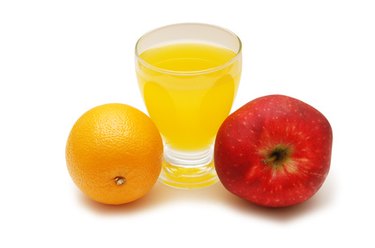
Your body's pH levels can be lowered naturally if you are experiencing abnormal alkalinity, which can lead to sickness and physical discomfort. According to Dr. Ben Kim in his article "Essential Details on Acid and Alkaline-Forming Effects of Food and How Your Body Maintains a Healthy pH," published on his website, your body's normal pH levels should be no lower than 7.35 and no higher than 7.45. Extremely high pH levels in your body can cause alkalosis, which, according to the U.S. National Library of Medicine, can affect your health and lead to arrhythmia, coma and electrolyte imbalance.
Step 1
Use a litmus test strip to test the alkalinity in your body. You can also have a urinalysis done by a laboratory if you prefer it.
Video of the Day
Step 2
Determine the cause of your high alkalinity. With hyperventilation, your body has low levels of carbon dioxide, which is acidic, in proportion to its levels of bicarbonate, which is alkaline. It can also be caused by a lack of potassium, especially if you are taking diuretic medication. A loss of chloride from vomiting can also boost alkalinity, notes the website Medline Plus.
Step 3
Breathe into a paper bag for 10 full breaths to bring acidic carbon dioxide into your body. You may begin to feel light-headed, in which case you can stop, as this is a sign that you have more carbon dioxide than oxygen in your system.
Step 4
Incorporate potassium and chloride-rich foods and drinks into your diet. Some foods that are rich in potassium include raisins, apricots, figs and wheat germ. You can make a nice breakfast with these fruits and add yogurt and honey or eat them with your cereal and oatmeal. Drinks rich in both chloride and potassium include juices made with apples, carrots, grapes, grapefruits, oranges and pineapples, according to the "American Journal of Clinical Nutrition."
Step 5
Keep your lungs and kidneys healthy to help them keep your acids and bases in balance by incorporating exercise into your daily life, with at least 20 minutes of cardiovascular exercise five times per week. Drink water to hydrate your system and aid your kidneys in their filtration and elimination of toxins.
Things You'll Need
Litmus test strip
Paper bag
Chloride- and potassium-rich foods and drinks
Tip
Always consult your doctor before making changes to your diet or exercise routine if you are taking medication or are under any type of treatment to address your pH levels.
Video of the Day
Is this an emergency? If you are experiencing serious medical symptoms, please see the National Library of Medicine’s list of signs you need emergency medical attention or call 911.